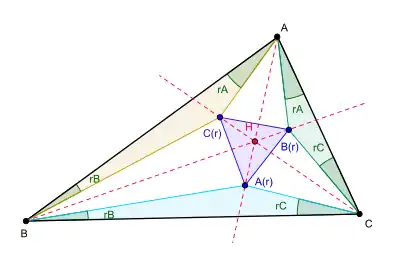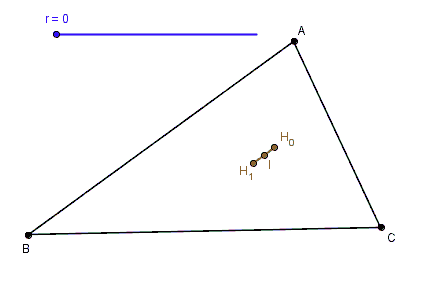Hofstadter points
In plane geometry, a Hofstadter point is a special point associated with every plane triangle. In fact there are several Hofstadter points associated with a triangle. All of them are triangle centers. Two of them, the Hofstadter zero-point and Hofstadter one-point, are particularly interesting.[1] They are two transcendental triangle centers. Hofstadter zero-point is the center designated as X(360) and the Hofstafter one-point is the center denoted as X(359) in Clark Kimberling's Encyclopedia of Triangle Centers. The Hofstadter zero-point was discovered by Douglas Hofstadter in 1992.[1]
Hofstadter triangles

Let △ABC be a given triangle. Let r be a positive real constant.
Rotate the line segment BC about B through an angle rB towards A and let LBC be the line containing this line segment. Next rotate the line segment BC about C through an angle rC towards A. Let L'BC be the line containing this line segment. Let the lines LBC and L'BC intersect at A(r). In a similar way the points B(r) and C(r) are constructed. The triangle whose vertices are A(r), B(r), C(r) is the Hofstadter r-triangle (or, the r-Hofstadter triangle) of △ABC.[2][1]
Special case
- The Hofstadter 1/3-triangle of triangle △ABC is the first Morley's triangle of △ABC. Morley's triangle is always an equilateral triangle.
- The Hofstadter 1/2-triangle is simply the incentre of the triangle.
Trilinear coordinates of the vertices of Hofstadter triangles
The trilinear coordinates of the vertices of the Hofstadter r-triangle are given below:
Hofstadter points

For a positive real constant r > 0, let A(r), B(r), C(r) be the Hofstadter r-triangle of triangle △ABC. Then the lines AA(r), BB(r), CC(r) are concurrent.[3] The point of concurrence is the Hofstdter r-point of △ABC.
Trilinear coordinates of Hofstadter r-point
The trilinear coordinates of the Hofstadter r-point are given below.
Hofstadter zero- and one-points
The trilinear coordinates of these points cannot be obtained by plugging in the values 0 and 1 for r in the expressions for the trilinear coordinates for the Hofstdter r-point.
The Hofstadter zero-point is the limit of the Hofstadter r-point as r approaches zero; thus, the trilinear coordinates of Hofstadter zero-point are derived as follows:
Since
The Hofstadter one-point is the limit of the Hofstadter r-point as r approaches one; thus, the trilinear coordinates of the Hofstadter one-point are derived as follows:
Since
References
- Kimberling, Clark. "Hofstadter points". Retrieved 11 May 2012.
- Weisstein, Eric W. "Hofstadter Triangle". MathWorld--A Wolfram Web Resource. Retrieved 11 May 2012.
- C. Kimberling (1994). "Hofstadter points". Nieuw Archief voor Wiskunde. 12: 109–114.
